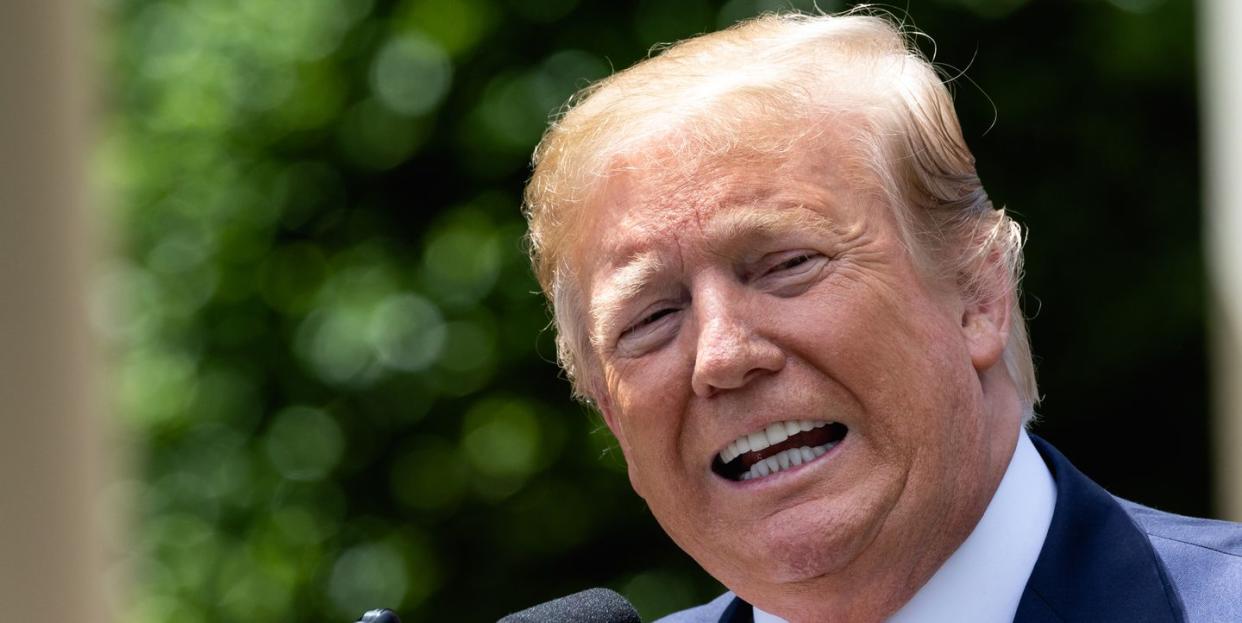The Damage to Trump's 'Image' Is the Least Important Takeaway from the Times' Tax Exposé

Holy Momma, this sounds like Henry Gondorff gone to heaven. From the NYT:
Mr. Trump was propelled to the presidency, in part, by a self-spun narrative of business success and of setbacks triumphantly overcome. He has attributed his first run of reversals and bankruptcies to the recession that took hold in 1990. But 10 years of tax information obtained by The New York Times paints a different, and far bleaker, picture of his deal-making abilities and financial condition. The data - printouts from Mr. Trump’s official Internal Revenue Service tax transcripts, with the figures from his federal tax form, the 1040, for the years 1985 to 1994 - represents the fullest and most detailed look to date at the president’s taxes, information he has kept from public view.
Though the information does not cover the tax years at the center of an escalating battle between the Trump administration and Congress, it traces the most tumultuous chapter in a long business career - an era of fevered acquisition and spectacular collapse. The numbers show that in 1985, Mr. Trump reported losses of $46.1 million from his core businesses - largely casinos, hotels and retail space in apartment buildings. They continued to lose money every year, totaling $1.17 billion in losses for the decade.
Unless he's got David Copperfield for an accountant, there has to be a staggering morass of criminal chicanery, large and small, buried in these numbers somewhere.
In fact, year after year, Mr. Trump appears to have lost more money than nearly any other individual American taxpayer, The Times found when it compared his results with detailed information the I.R.S. compiles on an annual sampling of high-income earners. His core business losses in 1990 and 1991 - more than $250 million each year - were more than double those of the nearest taxpayers in the I.R.S. information for those years. Over all, Mr. Trump lost so much money that he was able to avoid paying income taxes for eight of the 10 years. It is not known whether the I.R.S. later required changes after audits.
Unless he's got Kriss Angel on his sales staff, he has to know that people are going to wonder how he managed to find the money to stay afloat for all those years and wonder why so much of his cash smells like Tide pods.
But in the granular detail of tax results, it gives a precise accounting of the president’s financial failures and of the constantly shifting focus that would characterize his decades in business. In contrast to his father’s stable and profitable empire of rental apartments in Brooklyn and Queens, Mr. Trump’s primary sources of income changed year after year, from big stock earnings, to a single year of more than $67.1 million in salary, to a mysterious $52.9 million windfall in interest income. But always, those gains were overwhelmed by losses on his casinos and other projects.
The new information also suggests that Mr. Trump’s 1990 collapse might have struck several years earlier if not for his brief side career posing as a corporate raider. From 1986 through 1988, while his core businesses languished under increasingly unsupportable debt, Mr. Trump made millions of dollars in the stock market by suggesting that he was about to take over companies. But the figures show that he lost most, if not all, of those gains after investors stopped taking his takeover talk seriously.
Once again, we learn that the only difference between how corporate America operates and how the average third-rate casino operates is that you can't get comped for drinks at the Stock Exchange.

One of the things I don't care about at all is whether or not this undermines the president's "image" as a financial genius. Anybody who still believed that should not be allowed to cut their own meat anyway. He got elected by weaponizing fear and bigotry. The plane and the helicopter rides and the big old golden escalator were just the trappings. Now, though, we have reached something close to nutcutting time. Somebody leaked this stuff to the Times. Somewhere in the vast woodlands of the federal bureaucracy, somebody has started a fire.
As losses from his core enterprises mounted, Mr. Trump took on a new public role, trading on his business-titan brand to present himself as a corporate raider. He would acquire shares in a company with borrowed money, suggest publicly that he was contemplating buying enough to become a majority owner, then quietly sell on the resulting rise in the stock price.
The tactic worked for a brief period - earning Mr. Trump millions of dollars in gains - until investors realized that he would not follow through. That much has been known for years. But the tax information obtained by The Times shows that he ultimately lost the bulk of the gains from his four-year trading spree...As with many things Trump, his adventures in the stock market were more image than substance, helped greatly by news reports quoting anonymous sources said to have knowledge of Mr. Trump’s actions.
And John Barron makes his long-awaited appearance on the big stage.
This is a big, meaty expose. It's worth reading twice-once for the information and then again for the warm feeling of having every one of your tawdriest financial speculations about the president* confirmed. And believe me, you can labor for decades in this business and not be gifted by the journalism gods with a kicker like the one the Times reporters got.
At his nadir, in the post-recession autumn of 1991, Mr. Trump testified before a congressional task force, calling for changes in the tax code to benefit his industry. “The real estate business - we’re in an absolute depression,” Mr. Trump told the lawmakers, adding: “I see no sign of any kind of upturn at all. There is no incentive to invest. Everyone is doing badly, everyone.” Everyone, perhaps, except his father, Fred Trump.
While Donald Trump reported hundreds of millions of dollars in losses for 1990 and 1991, Fred Trump’s returns showed a positive income of $53.9 million, with only one major loss: $15 million invested in his son’s latest apartment project.
Damn, that's beautiful.
Respond to this post on the Esquire Politics Facebook page here.
('You Might Also Like',)

